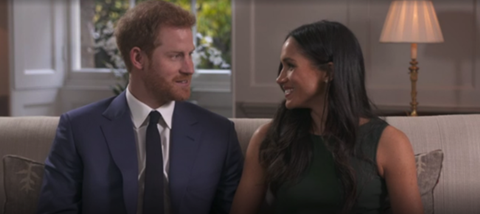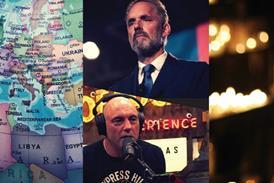
Everyone is delighted at the news of another royal engagement – and, with the anticipation of a royal baby in the new year as well, it is bound to lift our spirits. Most people feel that, amidst the gloom of Brexit and the slow economy, we will have something to celebrate. Most…but not all. Melanie McDonagh in The Spectator points out that Markle is an unusual royal bride in being previously married and divorced:
"Prince Harry is fifth in line to the throne so constitutionally it doesn’t matter a hoot who he marries because neither he nor his children are going to become monarch, but, for what it’s worth, Meghan Markle is unsuitable as his wife for the same reason that Wallis Simpson was unsuitable: she’s divorced and Harry’s grandmother is supreme governor of the CofE. The last person who made any personal sacrifice for that particular principle was Princess Margaret, and you could argue it didn’t end terribly well."
The fact that so little comment elsewhere has been made indicates how far attitudes have changed. Being divorced no longer carries the stigma it did 10 or 20 years ago. In this regard, we sit somewhere between Europe and the US; divorce rates in the UK are much higher than they are in Europe, but not as high as in the States.
Marriage in church – or at all – for divorcees?
But the specific question for the royal couple is whether they should be married in a Church of England church. The C of E believes that marriage is a lifelong union – but that in itself does not determine whether people who have gone through divorce may be remarried, and whether the second wedding ceremony can take place in church using the Church’s rite.
In 1938, the Church of England stated that: “both divorce itself and remarriage after divorce during the lifetime of a former partner always involve a departure from the true principle of marriage”, and “the Church should not allow the use of [the Marriage] Service in the case of anyone who has a former partner still living”. But that was a relatively recent view; Christians debated the question of remarriage after divorce for the first 1,000 years after Jesus, and have come to different views.
The Roman Catholic church believes marriage to be ‘indissoluble’: when a man and woman ‘become one flesh’ in marriage (as per Genesis 2:24, reiterated by Jesus in Mark 10:8, and by Paul in 1 Corinthians 6:16) this effects an ‘ontological’ change in them. They, as it were, become one person, and this union can only be broken by death. This is related to the Catholic belief in marriage as a sacrament – an outward sign of an inward, spiritual reality and change. But the Church of England does not understand marriage to be a sacrament like baptism and Communion, and believes with most Eastern churches that, while marriage is a lifelong commitment, it is not indissoluble, so divorce (though not desirable) is actually possible.
In 1938, the Church of England stated that: “both divorce itself and remarriage after divorce during the lifetime of a former partner always involve a departure from the true principle of marriage”
As a result of this, the Church of England changed its practice in 2002 – not by changing what it believes about marriage (that is, changing neither canon law nor its liturgy) but by changing its practice. Those who have been married and divorced, and have their former partner still living, can now be married in church – but this is still to be considered ‘the exception’, and it is hedged around by conditions. You can read these on the Church’s new wedding website. The new relationship must have played no part in the ending of the previous one, and those who are divorced need to have learned and experienced healing from the former relationship. To bring festering wounds from a former breakdown into a new relationship will be disastrous.
This is why Prince Charles and Camilla Parker-Bowles were not married in church, but (uniquely for a member of the Royal family) had a civil wedding followed by a service of blessing.
Jesus’ teaching on marriage and divorce
All this debate rests on Jesus’ teaching on marriage recorded in Matthew and Mark’s gospels. Mark’s version is briefer and appears more restrictive; in response to a direct question from the Pharisees: “Is it lawful for a man to divorce his wife?” (Mark 10:2). Jesus appears to repeal Moses’ provision of divorce as a concession to sin, and returns to Genesis 2 as the foundation of marriage permanence. (It is worth noting that Jesus still sees divorce as possible, but, as equivalent to adultery, hardly desirable.) But Matthew’s longer version gives us a clue as to the real issue at stake: “And Pharisees came up to him and tested him by asking, ‘Is it lawful to divorce one’s wife for any reason?’” (Matthew 19:3).
Jesus wasn’t being asked a general question about divorce; he was being challenged about the specific issue of ‘any reason’ divorce. Did he side with the school of Rabbi Hillel, who believed that a man could put away his wife for any reason he chooses, including something trivial like burning the dinner? Or did he side with the stricter view of Rabbi Shammai, who believe that divorce should only happen on serious grounds?
Jesus took the stricter view – though, in the context of the debate, not prohibiting divorce absolutely. But he also undermined the right of the husband to make the decision regardless – and, rather shockingly, held husbands accountable for their behaviour. The symmetrical sexual ethic of marriage in the early Christian movement was a sharp contrast to most pagan ethics, which gave priority to men and their needs.
The effects of divorce
The change of practice in the Church of England came after 20 years of debate, and careful study for six years led by the then Bishop of Winchester, Michael Scott-Joynte. Marriage is a serious commitment, intended to be lifelong. Divorce is a serious breakdown of this relationship. Remarriage after divorce is a serious possibility that can bring healing and restoration.
But of course the question has moved on in wider culture. The Office for National Statistics tells us that 42 per cent of marriages in the UK end in divorce. That brings real pain and has a real cost. The growth of single-person households is a major factor in the present housing shortage in the UK. And parental divorce is the single largest factor in inhibiting attainment of children in school, alongside the emotional damage that is done.
Encouragement for those entering marriage
Perhaps the more important question in relation to Prince Harry and Meghan Markle is: what can we do to support and encourage them in their marriage, enabling it to be the fruitful, integrated and lifelong commitment that God intends? And what can we do for those around us who are also entering this way of life, “a gift of God in creation, hallowed by him, which all should honour and uphold”? What can we do to counter the cultural, social and economic pressures that threaten this?
Click here to request a free copy of Premier Christianity magazine




























